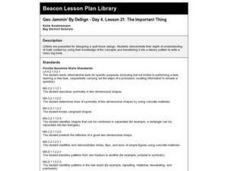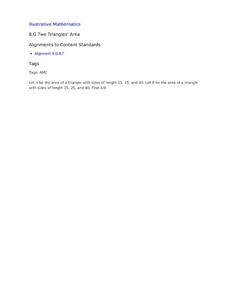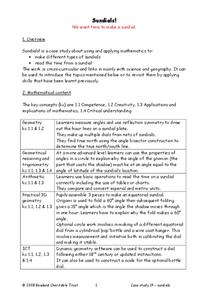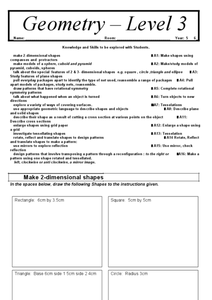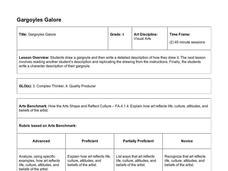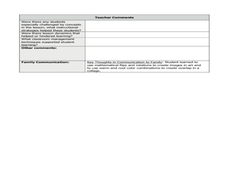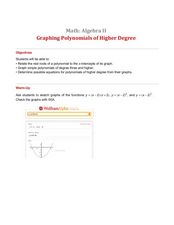Curated OER
Reflections over Two Lines & Dilations
Learners create reflections over two lines. In this reflections worksheet, students compare and contrast reflections over parallel and intersecting lines. They dilate figures and investigate the effect of the dilation using measurement...
Curated OER
Nature Walk
Learners explore nature artists and participate in a nature walk. In this art/nature lesson plan, students discuss things artists use from nature then talk a walk to find some of the same things. Learners look for different shapes and...
Curated OER
Signal Flags
Pupils examine the use of signal flags on vessels. They use measurements and symmetry to create their very own signal flag. Students work together and as individuals to solve problems and express their ideas.
Curated OER
Mum's Kitchen Floor
Students discuss patterns on a chess board examining symmetries. They read the problem and then brainstorm for ways to solve the problem. As they complete the floor pattern, they record symmetries that it contains.
Curated OER
Tessellating Art
Fourth graders create artwork showing their own unique tessellating shapes. They apply the symmetries of a regular polygon and describe the reflection or rotational symmetry of a figure or object. They share their art work with the class.
Curated OER
Ge-Oh Boy, Oh Boy
Young scholars listen to the book, Sam Johnson and the Blue Ribbon Quilt and discuss the art of quilting. They examine various symmetrical sewing designs, and identify reflection pieces, slides, and flips.
Curated OER
Geo Jammin By Design: The Important Thing
Students brainstorm what they know about geometric terms and patterns. They identify symmetry, shapes and congruency. They create a book of symmetry.
Curated OER
Keeping Us in Stitches Activity: Appliqué Bedcover Design
High schoolers explore patriotic and classical motifs in applique design and technique. A bedcover or quilt is produced using appropriate symmetry, color,proportion and composition.
Curated OER
Noughts
Students try to figure out the strategies to the game Noughts. Students logic must play a part in the process of the game. Students apply the symmetries of regular polygons. Students devise ways to critically follow a chain of reasoning.
Curated OER
Artists, Architects, and Architecture
Students are introduced to the concept of architecture and how it has changed over time. In groups, they discuss how the places people have built reflects their values and needs. They use the internet to research the history of...
Curated OER
Two Triangles' Area
Need an activity for teaching the Pythagorean Theorem? Geometry juniors apply the Pythagorean theorem to two triangles to determine a final calculation.
Bowland
Sundials!
Time to learn about sundials. Scholars see how to build sundials after learning about Earth's rotation and its relation to time. The unit describes several different types of possible sundials, so choose the one that fits your needs — or...
Curated OER
Power Function Inverses
Pupils graph polynomial functions and analyze the graphs. They identify the inverse of the functions and find the domain and range. Learners will then label the functions as one to one and use the horizontal and vertical line test to...
Curated OER
Geometry Level 3
What a wonderful resource! Learners create two-dimensional shapes according to the instructions stated, use the squares to make a triangular prism, a cube, and a pyramid, and identify features of plane shapes, among a myriad of other...
Virginia Department of Education
High School Mathematics Geometry Vocabulary Word Wall Cards
Having a good working knowledge of math vocabulary is especially important for geometry learners. Here are 119 pages worth of wonderfully constructed definitions, constructions, formulas, properties, theorems, and postulates. This is a...
Mathematics Vision Project
Module 6: Congruence, Construction, and Proof
Trace the links between a variety of math concepts in this far-reaching unit. Ideas that seem very different on the outset (like the distance formula and rigid transformations) come together in very natural and logical ways. This unit...
NTTI
Transform Your Geometry into a Work of Art
Mathematicians utilize artwork to help illustrate the major ideas of transformations and tessellations. They visually identify transformations including reflections, rotations, and translations. They discuss how artists have used...
Virginia Department of Education
Transformations
The coordinate plane is a popular place! Identify rotations, reflections, and dilations on the coordinate plane. Pupils work in small groups to match transformations of a figure with the description of the transformation. They perform...
Busch Gardens
Create an Invertebrate
What better way for young biologists to learn about invertebrates than by creating their very own? Here, students are assigned a set of invertebrate characteristics and are asked to invent an imaginary ocean animal and a separate...
EngageNY
The Definition of a Parabola
Put together the pieces and model a parabola. Learners work through several examples to develop an understanding of a parabola graphically and algebraically.
Hawaiʻi State Department of Education
Gargoyles Galore
Grrrrr, gargoyles are on the loose! Young artists are familiarized with the history of gargoyles, examine pictures of them, and hear a story about them. Then, they draw a gargoyle and write down exactly how they did it (procedural...
Curated OER
Geometric Collages
Fourth graders investigate the concept of geometric patterning. They create their own patterns with a few basic requirements. The patterns must illustrate the concepts of flipping, 90 and 180 degree rotations. The collages also consist...
Curated OER
Ranking Molecular Properties Based Upon Intermolecular Forces
A splendid chart of information about chemical bonding tops the first page. In it you will find information on London forces, permanent dipoles, hydrogen bonds, ionic bonds, and covalent bonds. A four-step process for assigning...
Curated OER
Graphing Polynomials of Higher Degree
Using Wolframalpha graphing capabilites, algebra learners graph polynomials with degrees of three and larger. They identify the roots and graph each polynomial, predict zeros and shapes of graphs, and validate their understanding through...








